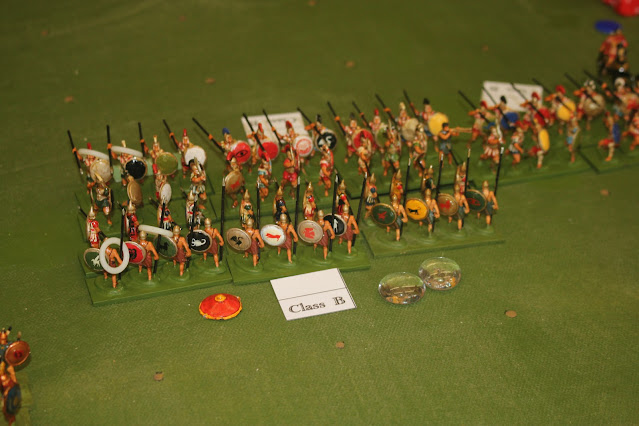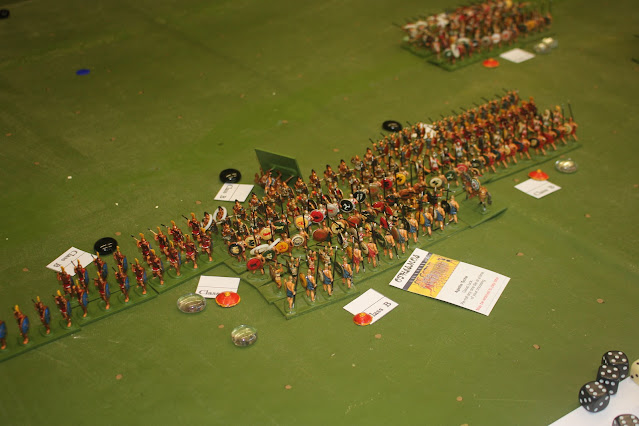We were supposed to have a quarterly game with our friend from the West Country this Wednesday, but he had to cry off at short notice.
Still, I'd done the work and got all the toys out, so Phil, Chris and I went ahead anyway. Phil had played Simon McDowell's "Alala" hoplite rules in development at the Society of Ancients Conference, and wanted to replay his 2nd Mantinea scenario.
Now that's a lot of hoplites. Phil didn't have the full scenario, per se, but gave me some tips as to numbers, and I combined that with Sabin's Lost Battles analysis, to get army compositions.
The idea of the rules is that you spend a lot of time getting your troops to line up, then you gee them up with rousing speeches, or consult the gods, all the while trying to get your men in a battle frenzy, whilst hoping no one goes off half cock. So these are the forces available to each side - Thebans to the right - which amounts to 200+ hoplite figures a side. I had to pull in some ringers. There are some Carthaginians in their somewhere, for example.
Here we are with everyone lined up. The Thebans get bonuses for deploying deep, otherwise you need a lot of space.
We started off with some skirmishing on the Theban left. My feeling, at this stage, is that the rules were written first for hoplites, then other troop types tacked on. There's nothing on wheeling any troop type, except for hoplites, for example, but these are early days, and I may have been missing the obvious when reading the rules. The black pebbles (and clear elsewhere) are disorder points.
We got a cavalry fight out on the right. The rules have a system whereby you compare hits then read off a positive and negative outcome on a small table. I liked this, as it has some elements from the "To Ur" Fear test, and also the forced outcome I get in FWTDR/IRFI.
We didn't have enough control points to do all we wanted, and having got a unit to fever pitch (big red shield behind) it decided to mix it with the enemy, and went off at a run.
Nothing for it but to send the rest of the phalanx forwards.
They're still being out paced by the other guys tho'.
Hoplites clash. It is all a bit indecisive. The combat is BODS, and we get extreme outcomes from time to time. Mostly we get both sides inflicting similar numbers of hits, causing attrition.
Fighting is breaking out everywhere. It is mostly indecisive still.
Even fully hyped up Sacred Band + Supports can't make a breakthrough.
Ah ha! A Gods card is played, and the enemy commander is killed. This actually made very little difference. The Sacred Band still can't get a decisive win.
To their right, however, their supports are given a hammering in the dice rolling, and lose by 5 hits. They are thrown back. We had some issues with the follow up rules at this point.
More meat grinding at the far end, and another general dies.
The Spartans finally get the upper hand, and break through. I would point out that there's no skill involved in any of this at this point. It's just about rolling more 5s & 6s.
I'm not just saying that because I'm on the losing side.
Oh no! Phil's flank is falling a part.
The centre is going our way a bit, however.
Hooray! The Thebans finally broke through!
We stopped then. We'd played just over four hours, and both armies had ground themselves to a stalemate. At first I thought it was a Theban win, but the Spartan left was looking solid. To get a result, both lines needed to swing through 90 degrees, line up and have another go.
It was an interesting game. Good take on setting up a hoplite battle, and trying to find something interesting to do with two lines of infantry charging at each other and slogging it out. We all liked the command options of calling on the gods, forming troops up, inspiring your men and so on. That is most of the game, I think, and the actual battle needs to be resolved more smartly, rather than hanging around. That could have been down to our odd dice rolling, but BOD systems will do that to you.
I have a page of notes to write up for the designer. It's just about finding the time.

















Those are two very long, thin lines at the start.
ReplyDeleteWhich is how it should be. Hellenistic Greeks not known for having reserve lines.
Delete